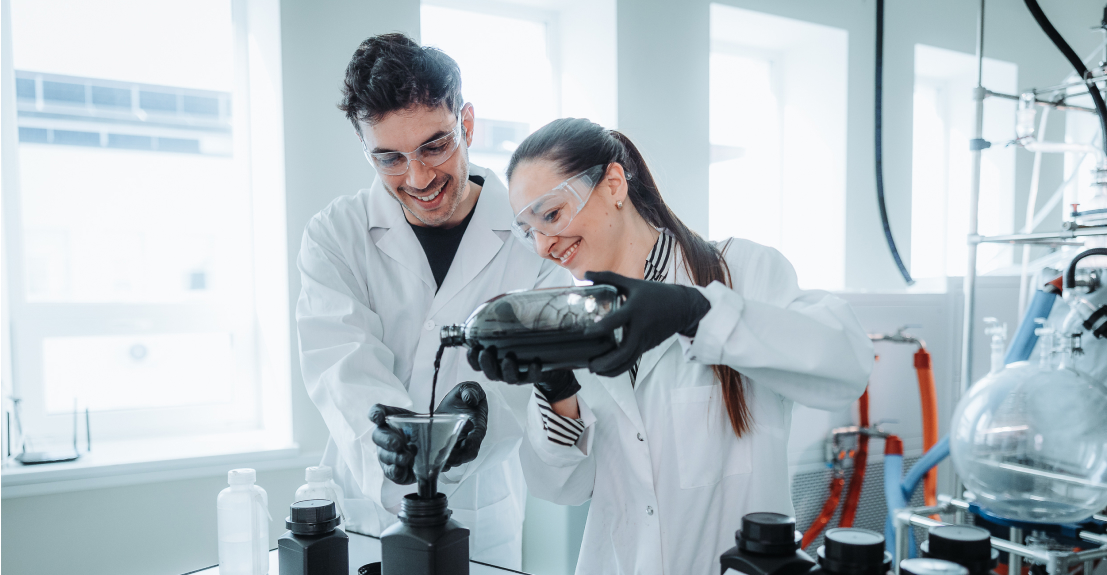Home » Green ICT 2 Project

Project Name
Further Development of CO₂-negative Concrete for Market Growth.
The project is co-funded by Norway Grants Green ICT programme.
Project Number: 2014-2021.1.02.22-0188
Project Time Frame: 01.05.2023 – 30.04.2024
Project Description
This project can have a huge impact on lowering the greenhouse gas emissions of the cement industry, which currently accounts for a whopping 8% of all global CO₂ emissions, as 50% less concrete can be used in construction using the materials developed in this project due to its improved strength properties. Furthermore, as 3.7 kg of CO₂ will be sequestered in the process of producing 1 kg of carbon nanomaterials used in our product, further CO₂ emission reduction goals will be fulfilled. By developing a more economical geopolymer product in this project, we will make these reductions attractive and available to more industries. Furthermore, this project focuses on developing concrete that is suitable for underwater applications such as offshore wind farms, helping to further empower the green energy transition in Europe and beyond.
The goal of the project
The primary goal of this project is to advance UP Catalyst and Saferock collaboration by further enhancing their joint products, specifically focusing on the development of ox-CNTs with a higher oxygen content. This innovation is pivotal as it enables the creation of two cutting-edge geopolymer products with the potential to penetrate new market sectors, thereby fostering market expansion.
1. We aim to produce a geopolymer product where ox-CNT additives can be used at a lower percentage, while still delivering significant improvements in mechanical properties. This will cater to clients seeking cost-effective solutions.
2. We intend to develop a geopolymer product with higher ox-CNT content, resulting in stronger and less water-permeable concrete, a characteristic highly sought after by the burgeoning offshore wind park construction industry, which is projected to reach a market size of EUR 800 billion by 2050. These objectives align with our commitment to innovation and addressing diverse market needs.
Partners
SafeRock AS
Project progress
The project has started successfully and we will provide updates on its progress soon.
Project funding
The total project budget is 300 060 euros, which is supported by Norway Grants “Green ICT” programme for the amount of 149 999 euros.
Contact us
Mirjam-Kim Rääbis
Product Developer at UP Catalyst & Project Coordinator
kim@upcatalyst.com
Inger Lise Alsvik, PhD
Scientific Researcher at Saferock & Project Coordinator
inger.lise.alsvik@saferock.no
Projekti nimi
CO₂-negatiivse betooni edasiarendus turu kasvuks.
Projekti kaasrahastab Norway Grants Green ICT programm.
Projekti number: 2014-2021.1.02.22-0188
Projekti ajakava: 01.05.2023–30.04.2024
Projekti kirjeldus
Sellel projektil võib olla tohutu mõju kasvuhoonegaaside heitkoguste vähendamisele tsemenditööstuses, mis praegu moodustab 8% kõigist ülemaailmsetest CO₂-emissioonidest, kuna projektis väljatöötatud materjalide abil saab ehituses kasutada 50% vähem betooni tänu selle täiustatud tugevusomadustele. Lisaks, kuna meie tootes kasutatava 1 kg süsiniknanomaterjali tootmise käigus seotakse 3,7 kg CO₂, saavutatakse CO₂ heitkoguste vähendamise eesmärgid. Töötades selle projekti raames välja ökonoomsema geopolümeeri toote, muudame need vähendamised atraktiivseks ja kättesaadavaks rohkematele tööstusharudele. Lisaks keskendub see projekt betooni väljatöötamisele, mis sobib veealusteks rakendusteks, näiteks avamere tuuleparkideks, aidates veelgi võimendada rohelise energia üleminekut Euroopas ja mujal.
Projekti eesmärk
Selle projekti esmane eesmärk on edendada UP Catalysti ja Saferocki koostööd, täiustades veelgi nende ühiseid tooteid, keskendudes konkreetselt suurema hapnikusisaldusega ox-CNT väljatöötamisele. See uuendus on pöördelise tähtsusega, kuna võimaldab luua kahte tipptasemel geopolümeerset toodet, millel on potentsiaal tungida uutesse turusektoritesse, soodustades seeläbi turu laienemist.
1. Meie eesmärk on toota geopolümeertoodet, milles ox-CNT lisandeid saab kasutada väiksema protsendimääraga, parandades samal ajal oluliselt mehaanilisi omadusi. See teenindab kliente, kes otsivad kulutõhusaid lahendusi.
2. Kavatseme välja töötada suurema ox-CNT sisaldusega geopolümeertoote, mille tulemuseks on tugevam ja vähem vett läbilaskev betoon, mis on tõusev avamere tuuleparkide ehitustööstus väga ihaldatud omadus, mille turu suurus peaks 2050. aastaks olema 800 miljardit eurot. Need eesmärgid on kooskõlas meie pühendumusega innovatsioonile ja erinevate turuvajadustega tegelemisele.
Partnerid
SafeRock AS
Projekti edenemine
Projekt on edukalt alanud ja peagi anname selle edenemise kohta värskendusi.
Projekti rahastamine
Projekti kogueelarve on 300 060 eurot, mida toetab Norra Grants “Green ICT” programm summas 149 999 eurot.
Võtke meiega ühendust
Mirjam-Kim Rääbis
UP Catalysti tootearendaja ja projektikoordinaator
kim@upcatalyst.com
Inger Lise Alsvik, PhD
Saferocki teadustöötaja ja projektikoordinaator
inger.lise.alsvik@saferock.no